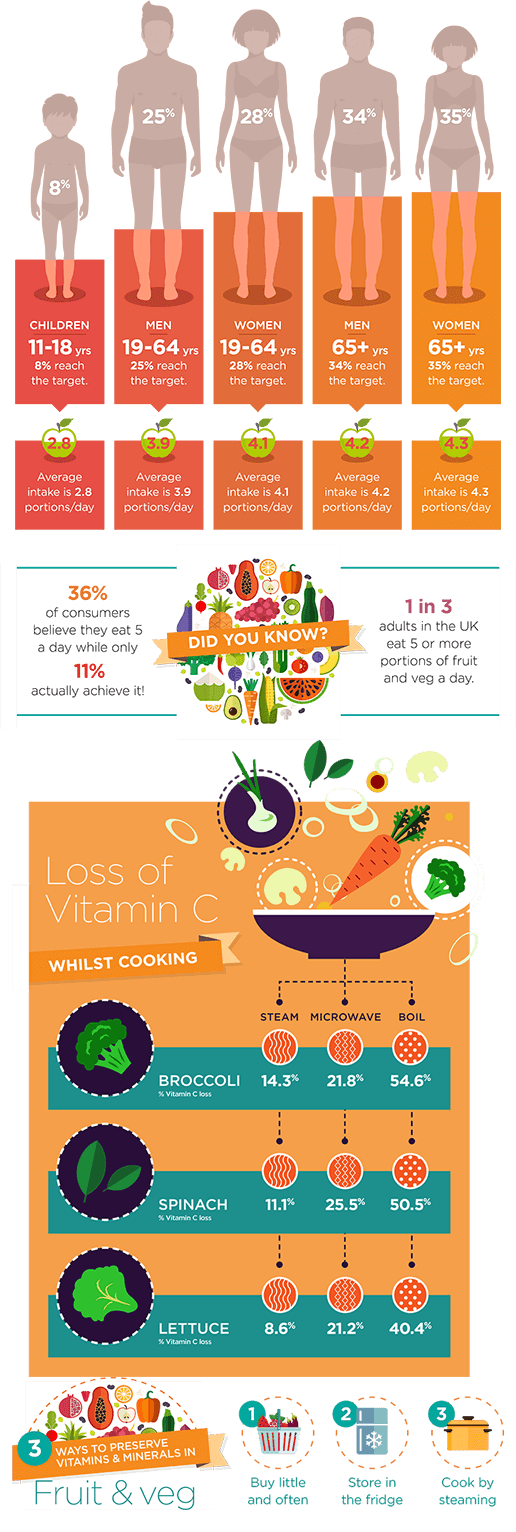Nutritionist Fiona Hunter believes in the principle that 'there's no such thing as a bad food, only a bad diet.' Here, she gives us an insight into whether our diet is really capable of providing all the nutrients we need to stay healthy.
When I was studying nutrition at University we were taught that a healthy balanced diet could provide all the vitamins and minerals we need to keep our body fit and healthy. That was almost 40 years ago and a lot can change in 40 years.
One of the most notable changes in the world of nutrition is a shift in focus from adequate to optimal nutrition. So, for vitamin and minerals the focus has changed from thinking about them in terms of their role in the prevention of nutritional deficiencies like scurvy and rickets, to the role that they can play in helping to reduce the risk of a whole host of conditions like certain types of cancer, dementia and heart disease.
35 years ago I was taught that Vitamin C was needed to prevent scurvy, a deficiency disease that was common in the 18th century amongst sailors who undertook long sea voyages, a condition which fortunately is very rarely seen in 21st Century Britain. We were also taught that it was possible to get all the vitamin D we needed from the action of sunlight on skin, but we now know that this is very unlikely - particularly in the UK from September through to March. Nutrition is an evolving science and new research is being published all the time which shows that vitamins and minerals do so much more than simply prevent deficiency diseases.
The role of Reference Nutrient Intakes (RNIs)
The UK Reference Nutrient Intakes (RNIs), sometimes called the Recommended Daily Amounts (RDA), or Recommended Daily Intake (RDI), which are used as a guide to the amount of vitamins and minerals needed by different population groups in the UK, were published in 1991 in the report 'Dietary Reference Values for Food Energy and Nutrients for the UK'. Some of the nutrients such as vitamin D have been updated in the last 26 years by the Scientific Committee on Nutrition (SACN), but it is a slow process and many nutrition experts feel that a review of all the RNI's is long overdue, particularly since they were originally calculated on the minimum amount of a nutrient needed to prevent deficiency diseases.
The fact the vitamin and mineral requirements are significantly higher in some other countries is another reason that experts believe it's time to re-evaluate the role of micronutrients in health and wellbeing. For instance in the USA the RNI for Vitamin C for women in the 31-50 age group is 75mg - in the UK it's a meagre 40mg. The US RNI for calcium for women over 51 is 1200mg/day and in the UK its 700mg, for potassium the guideline is 4,700mg but in the UK its almost 50% less (2500mg).
Are we really eating a healthy balanced diet?
Experts who claim that we can get all the nutrients we need from our diet always use the caveat 'a healthy balanced diet'. But hand-on-heart how many of us can say we eat a healthy balanced diet 100% of the time and even if we are confident that our diet is healthy, does it really provide all the nutrients we need?
Fruit and vegetables are one of the most important sources of many vitamins and minerals and while there are some areas of nutrition, like the role of saturated fat, on which nutritionists have different opinions, one area where there is a consensus is the fact that most of us need to eat more fruit and veg. But while 90% of UK adults say they are aware of the recommendation to eat 5-a-day, less than a third (27%) of adults reach this target and in certain population groups like 11-18 years the figures are even lower.
Even if we do manage to eat 5 portions of fruit and veg a day can we be sure that they contain enough vitamin and minerals?
Some experts believe that intensive farming, which uses artificial fertilizers to encourage plants to grow bigger and faster, means that fruit and vegetable are less nutritious now than they were 60 years ago. A paper published in the Journal Hort Science in 20091 suggested that the nutrition content of some fruit and veg may have dropped by as much as 40% in the last 70 years. Another report published by UK nutritionist Dr David Thomas found that levels of iron, copper and calcium in vegetables had decreased by up to 76% since 1940. His research revealed that in vegetables, levels of magnesium had dropped by 25%, calcium and copper by 75%, in fruit iron had dropped by 25% and copper by 20%.2
Even if our fruit and veg do contain plenty of vitamins how many of them are still there by the time the food gets to your plate?
Your shopping habits, as well as the way you prepare and cook fruit and vegetables can also lead to a significant decline in the levels of vitamins and minerals. A study published in the Journal of Food Chemistry found that broccoli could lose up to 70% of its vitamin C and betacarotene and 50% of its antioxidant activity in the time it takes to get from farm to your plate. If vegetables are boiled in a large amount of water, vitamins C and B are leaked into the cooking water and up to 50% can be lost.

Our eating habits have changed quite dramatically in the last 5 decades
Think back to the sort of meals your parents and grandparents ate and then think about what you eat now. Our eating habits and diets have changed dramatically in the last 50 years - we're eating more heavily processed convenience food, more meals outside of the home, more fast food and more snack foods. In 1947 11% of the fruit and vegetables people ate were home grown, nowadays we eat green beans that have been flown in from Kenya, tomatoes from Morocco and apples that have come all the way from Argentina. Meal times have become less structured, less of a family affair - particularly amongst younger more urban groups.
The way we cook and shop has also changed -the UK's first supermarket opened in Streatham in 1950 but as technology advances there has been a shift away from shopping in larger supermarkets and towards shopping online. In a survey carried out by Mintel in 2016, 1 in 10 people said they did all their grocery shopping online, with a further 12% saying they do most of their food shopping online.3
Comparison of Reference Nutrient Intakes in different countries1
UK | UK | USA | USA | Sweden | Sweden | Aus | Aus | |
|---|---|---|---|---|---|---|---|---|
Women - aged | 19-50 | 50+ | 31-50 | 51+ | 31-60 | 61-74 | 31-50 | 51-70 |
Vitamin A (mcg) | 600 | 600 | 700 | 700 | 700 | 700 | 700 | 700 |
Vitamin E (mg) | - | - | 15 | 15 | 8 | 8 | 7 | 7 |
Vitamin D (IU) | 10mcg | 10mcg | 600IU | 600 IU | 10cmg | 10mcg | 5 | 10 |
Vitamin C (mg) | 40 | 40 | 75 | 75 | 75 | 75 | 45 | 45 |
Thiamin/B1 (mg) | 0.8 | 0.8 | 1.1 | 1.1 | 1.0 | 1.0 | 1.1 | 1.1 |
Riboflavin/ B2 (mg) | 1.1 | 1.1 | 1.1 | 1.1 | 1.2 | 1.2 | 1.1 | 1.1 |
Niacin (mg) | 13 | 12 | 14 | 14 | 14 | 13 | ||
Vitamin B6 (mg) | 1.2 | 1.2 | 1.3 | 1.5 | 1.2 | 1.3 | 1.3 | 1.5 |
Vitamin B12 (mcg) | 1.5 | 1.5 | 2.4 | 2.4 | 2.0 | 2.0 | 2.4 | 2.4 |
Choline (mg) | - | - | 425 | 452 | - | - | ||
Vitamin K (mcg) | - | - | 90 | 90 | - | - | 60 | 60 |
Folate (mcg) | 200 | 200 | 400 | 400 | 300 | 300 | 400 | 400 |
Calcium (mg) | 700 | 700 | 1000 | 1000 | 800 | 800 | 1,300 | 1,300 |
Iron (mg) | 14.8 | 8.7 | 18 | 8 | 15 | 9 | 18 | 8 |
Magnesium (mg) | 270 | 270 | 320 | 320 | 280 | 280 | 320 | 320 |
Phosphorus (mg) | 550 | 550 | 700 | 700 | 600 | 600 | 1000 | 1000 |
Potassium (mg) | 3500 | 3500 | 4700 | 4700 | 3100 | 3100 | 2800 | 2800 |
Zinc (mg) | 7 | 7 | 8 | 8 | 7 | 7 | 8 | 8 |
Copper (mg) | 1.2mg | 1.2mg | 0.9 | 0.9 | 0.9 | 0.9 | 1.2 | 1.2 |
Manganese (mg) | - | - | 1.8 | 1.8 | - | - | 5 | 5 |
Selenium (mcg) | 60 | 60 | 55 | 55 | 60 | 60 | 60 | 60 |
Iodine (mcg) | 140 | 140 | - | - | 150 | 150 | 150 | 150 |
Key
Reference Nutrient Intake
(RNI) is the amount of a nutrient that is sufficient to meet the needs of 97.5% of the population. Sometimes these are known as Recommended Daily Allowances (RDAs).
RNIs
are based on human experimental studies designed to assess the minimum amount of each nutrient necessary to avoid clinical signs of deficiency diseases, such as scurvy, ber-beri, anemia and pellagra.
Lower Reference Nutrient Intake (LRNI)
is the amount of a nutrient that is enough for only a small number (2.5%) of the population. Most people need more than this.
The Estimate Average Requirement
(EAR's) is the estimate of the average requirement of energy required. 50% of the population will need less and 50% will need more.
Reference intakes (RI)
are used on food labels as a guide to the amount of a nutrient and energy that you need for a healthy balanced diet. They replace what used to be called Guideline Daily Amounts (GDA's). They are based on the requirement of an average sized women doing an average amount of physical activity. They are not intended as a target for individuals, because an individual's needs vary depending on factors such as sex and age.
New dietary ingredients (NDI)
in relation to dietary supplements is an ingredient that was not marketed in a dietary supplement before a certain date (in the United States).
Upper Safe Levels (USLs)
have been identified by nutritional scientists as upper tolerable levels for the long-term use of vitamin and mineral supplements. These reflect the doses that most people can take every day without experiencing side effects.







